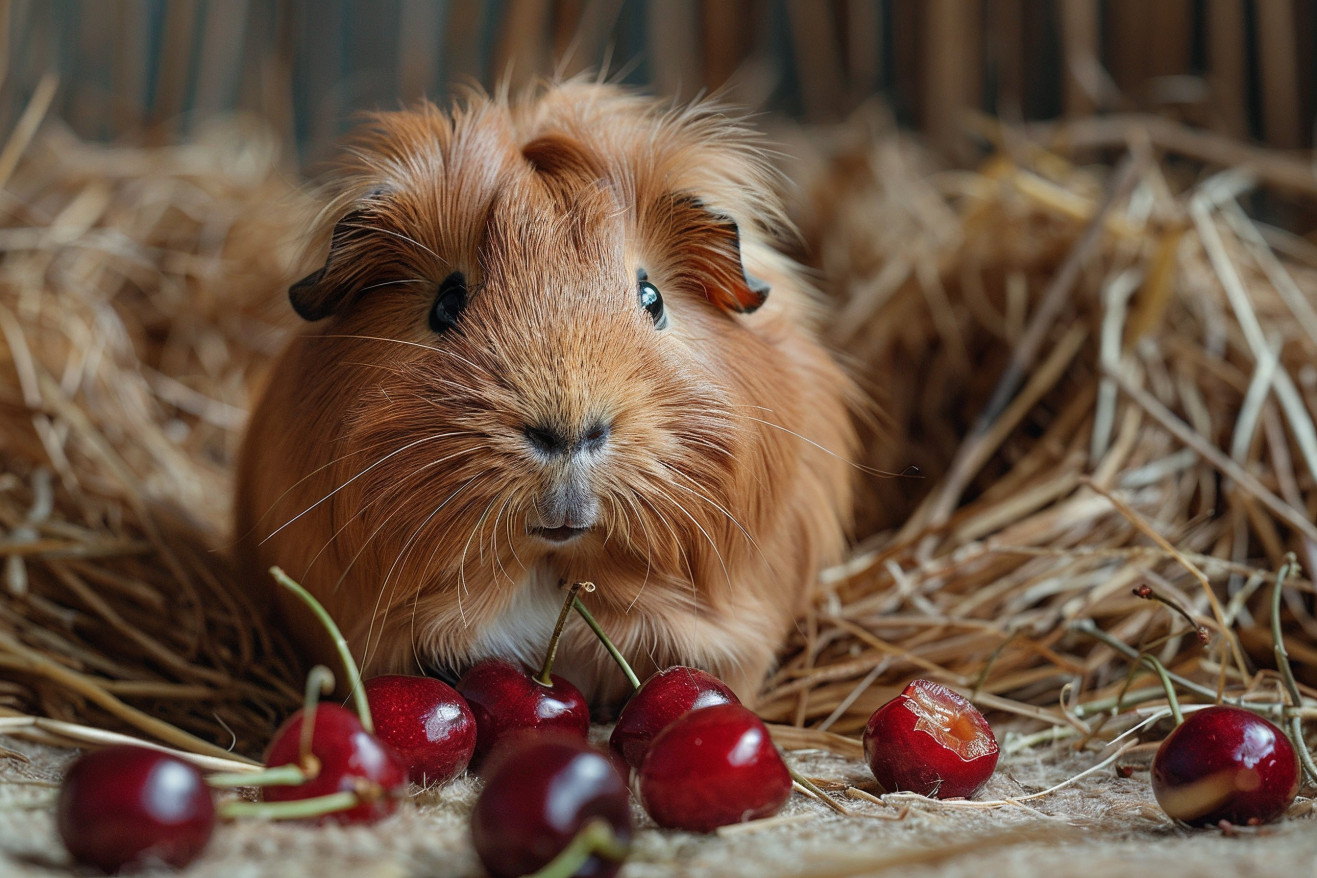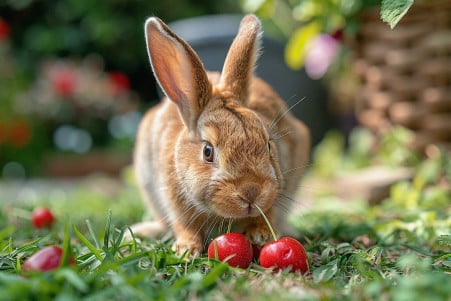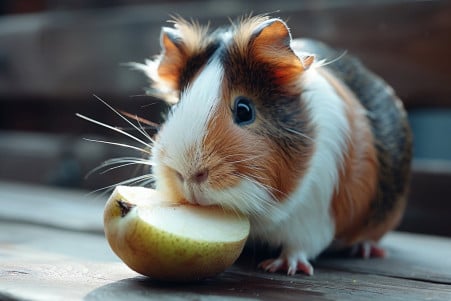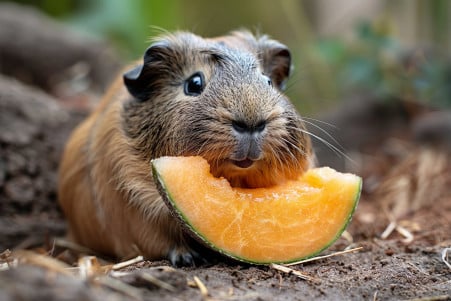Can Guinea Pigs Eat Cherries? A Closer Look
23 March 2024 • Updated 22 March 2024

If you're thinking about sharing some cherries with your guinea pig, here's what you need to know. Yes, guinea pigs can eat cherries in moderation. Cherries are a good source of vitamin C and other nutrients that can be good for guinea pigs. However, the pits and stems of the cherries need to be removed because they can be harmful to guinea pigs. It's also important to note that because cherries are high in sugar, it's best to limit your guinea pig's cherry intake to 1-2 cherries per week.
This article will provide you with valuable information from veterinarians and guinea pig owners so that you can safely add cherries and other fruits to your guinea pig's diet. This way, you can feel confident that you're making the best choices for your guinea pig's health and well-being. By learning about the fruits and vegetables that guinea pigs can and can't eat, you can ensure that you're giving your guinea pig a diet that will help them thrive.
Can guinea pigs eat cherries?
Nutritional Facts of Cherries for Guinea Pigs
Cherries can help guinea pigs meet their nutritional needs because of their high vitamin C content, which guinea pigs can't produce on their own. As the RSPCA points out, vitamin C is an important nutrient for guinea pigs and can be found in fresh foods like cherries. In addition to vitamin C, cherries are a good source of vitamin A, potassium, antioxidants and fiber, according to Guinea Pig Corner.
The fiber in cherries can help guinea pigs with digestion and prevent constipation. However, cherries are high in sugar, so they should be fed in small amounts and only occasionally. Pet Keen warns that guinea pigs can experience weight gain, diarrhea and other problems if they eat too many cherries because of their sugar content.
If they are fed in the right amounts and as part of a diet that's based on hay, fresh vegetables and a small amount of pellets, cherries can be a nutritious addition to a guinea pig's diet. Their vitamin C content, in particular, makes them a good choice for a fruit treat.
How Much and How Often Should You Give Your Guinea Pig Cherries?
The GuineaDad Fruit Master List suggests that guinea pigs should have one cup of fresh fruits and vegetables daily as a supplement to their hay and pellet diet. However, the Guinea Pig Forum says that cherries should be fed to guinea pigs occasionally, no more than 1-2 times a week. They recommend a portion size of 1-2 cherry pieces or a matchbox-sized amount per guinea pig.
To prevent tummy upsets, the Forum suggests introducing cherries slowly and in small amounts. The portion size can also be adjusted based on the age, size, and health of the individual guinea pig. In addition, Burgess Pet Care recommends that cherries should never account for more than 5% of a guinea pig's diet since the majority of their nutrition should come from hay, vegetables, and pellets.
What Parts of the Cherry Are Safe and Unsafe for Guinea Pigs?
The cherry fruit is safe for guinea pigs to eat, but the pits and stems are not. Hepper explains that cherry pits and stems have small amounts of cyanide, which can be poisonous to guinea pigs. Meanwhile, the safe branches list from Bunny Meadow warns against cherry leaves and branches due to potentially toxic compounds.
To make sure that guinea pigs can eat cherries without any risk, only the flesh of the fruit should be given to them, and the pits, stems, and leaves should be removed. The Humane Society adds that cherries should be washed before being given to guinea pigs to remove any pesticides or residues. If these steps are taken, guinea pigs can eat cherries as a treat.
What Other Fruits Can Guinea Pigs Eat?
In addition to cherries, there are several other fruits that guinea pigs can eat. According to Small Pet Select, some of the fruits that are safe for guinea pigs to eat include apples, apricots, bananas, watermelon, blueberries, cranberries, strawberries, raspberries, plums, pears, and red tomatoes.
That said, not all fruits are safe for guinea pigs to eat. For example, as The Spruce Pets points out, guinea pigs should not eat avocados, rhubarb, or the stems and leaves of tomatoes because they are toxic. In addition, citrus fruits like lemons are too acidic for guinea pigs to eat.
It's also important to offer guinea pigs a variety of fruits since different fruits have different nutritional profiles. For example, GuineaDad notes that fruits like kiwi, bananas, blueberries, watermelon, and cantaloupe are packed with vitamins, fiber, and antioxidants. That said, all fruits should be fed in moderation and should make up no more than 5% of a guinea pig's diet.
How to Keep Your Guinea Pig's Diet Balanced
Although cherries and other fruits can be given as a treat, the majority of a guinea pig's diet should be made up of hay, fresh vegetables, and a small number of pellets. The RSPCA explains that grass hay should make up the bulk (approximately 80%) of a guinea pig's diet, as it's a good source of fiber and other essential nutrients. Fresh leafy greens and vegetables should be fed daily, as they can provide important fiber, vitamins, and minerals.
Pellets that are fortified with vitamin C can also be part of a guinea pig's diet, but they should be fed in moderation to avoid obesity, according to PDSA. It's also important to weigh guinea pigs regularly and adjust their food intake as needed to ensure they're eating a balanced diet, notes The Anti-Cruelty Society. However, if hay, vegetables, and pellets are fed in the right proportions, guinea pigs can get the nutrition they need to stay healthy.
Conclusion: Can Guinea Pigs Have Cherries?
The evidence on whether guinea pigs can eat cherries is a bit more conflicting. Penthouse Piggies says that guinea pigs should not eat cherries at all because the pits and stems contain harmful toxins. In addition, the sugar in cherries can cause health problems like obesity and diabetes if consumed in large amounts.
On the other hand, Petskeeda and Pet Keen say that cherries can be a safe treat for guinea pigs as long as the pits and stems are removed. They also point out that cherries are a good source of vitamin C, which is an essential nutrient for guinea pigs.
The bottom line is that cherries should be fed to guinea pigs in moderation. They should be considered a treat rather than a regular part of a guinea pig's diet. It's also a good idea to introduce cherries to your guinea pig's diet gradually and watch for any signs of digestive upset. As always, a diet that's primarily based on hay, vegetables, and a small amount of pellets is the best way to keep your guinea pig healthy.


